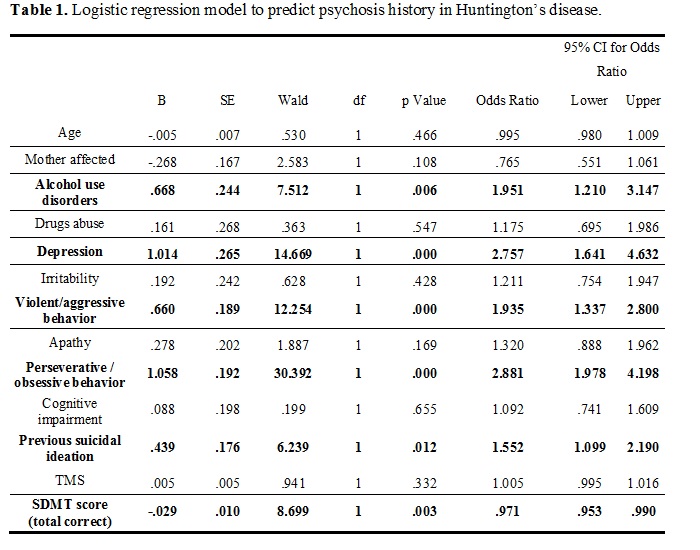Session Information
Date: Tuesday, June 6, 2017
Session Title: Huntington's Disease
Session Time: 1:45pm-3:15pm
Location: Exhibit Hall C
Objective: To evaluate predictors for psychosis in HD.
Background: Behavioral problems are present across all stages of HD, even preceding the development of the motor symptoms. While not so frequent in HD, psychosis can be very distressful for both individuals with HD and their caregivers. Psychotic symptoms have been underinvestigated in HD, and it remains to be established their predictors.
Methods: This study included 2303 manifest patients with HD from the Enroll-HD database (December 2015). First, we performed univariate analyses in order to investigate differences between HD patients with and without medical history of psychosis. Then, all variables that presented p<0.20 in the univariate analysis were included in a multivariate analysis (Binary Logistic Regression).
Results: Nearly 11% (N=248) of patients with HD presented history of psychosis. Among HD patients with medical history of psychosis, 55.3% were pre-morbid (i.e., the age of psychosis symptoms preceded the age of clinical diagnosis of HD) and 31.6% have current psychosis (i.e., PBA-s psychosis score ≥ 1). The CAG trinucleotide repeat length was not associated with psychosis. Patients with a history of psychosis presented with a higher frequency of behavioral problems and worse motor, functional capacity and cognitive scores than patients without a history of psychosis. A logistic regression was performed and patients with HD presenting medical history of alcohol use disorders, depression, violent/aggressive behavior, preservative/obsessive behavior and previous suicidal ideation were more likely to exhibit psychosis. Moreover, poorer performance in the Symbol Digit Modalities Test (SDMT) was associated with an increase in the likelihood of psychosis history (table 1). The logistic regression model was statistically significant (χ2 = 225.755, p = 0.000). The model explained 23.0% of the variance in psychosis history and correctly classified 90.9% of cases. [table 1]
Conclusions: Behavioral problems, previous suicidal ideation and poorer cognitive performance were significant predictors for psychosis in HD. Psychosis seems to occur in patients with HD that already have a burden of other non-motor symptoms. Further analysis in the larger database will allow refining the precision of predictors.
To cite this abstract in AMA style:
N. Rocha, E. Furr-Stimming, A. Teixeira. Predictors for psychosis in Huntington’s disease: preliminary analysis of the Enroll-HD database. [abstract]. Mov Disord. 2017; 32 (suppl 2). https://www.mdsabstracts.org/abstract/predictors-for-psychosis-in-huntingtons-disease-preliminary-analysis-of-the-enroll-hd-database/. Accessed February 1, 2026.« Back to 2017 International Congress
MDS Abstracts - https://www.mdsabstracts.org/abstract/predictors-for-psychosis-in-huntingtons-disease-preliminary-analysis-of-the-enroll-hd-database/

